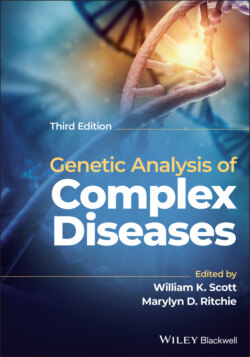Читать книгу Genetic Analysis of Complex Disease - Группа авторов - Страница 47
Point Mutations
ОглавлениеA point mutation is defined as an alteration in a single bp in a stretch of DNA, thereby changing the 3‐bp codon. Since the genetic code is degenerate, many such changes do not necessarily alter the resulting amino acid. However, if the single bp change leads to the substitution of one amino acid for another, the result can significantly affect the final protein product. Point mutations can be classified as transition mutations (purine → purine or pyrimidine → pyrimidine) or as the less common transversion mutations (purine → pyrimidine or pyrimidine → purine). In general, transitions are less likely than transversion mutations to change the resulting amino acid. Five effects of point mutations have been described:
Synonymous or silent mutations are single bp changes in the DNA that do not affect the resultant amino acid
Nonsense mutations result in a premature stop codon, leading to a polypeptide of reduced length
Missense mutations lead to the substitution of one amino acid for another
Splice site mutations affect the correct processing of the mRNA strand by eliminating a signal for the excision of an intron
Mutations in regulatory genes alter the amount of material produced
Several examples of point mutations in human diseases are illustrated below.
